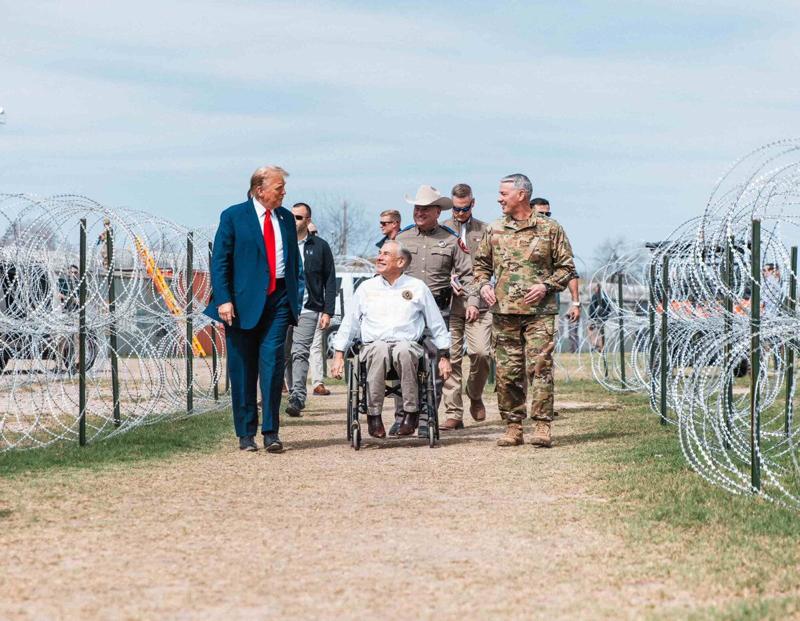President Donald Trump’s whiplash inducing trade war with Mexico keeps a sword hanging over the head of his counterpart in Mexico, a former ambassador said.
Arturo Sarukhan, a consultant who previously served as Mexico’s ambassador to the U.S., said Trump’s paused threat of a 25% tariff on imports put Mexico President Claudia Sheinbaum in a difficult spot with global trade, and the relationship between the two countries hangs in the balance.
“The postponement of tariffs for another month – and presumably as a weapon to be wielded by Trump as many times as he wants during the next four years – will only create a sword of Damocles hanging over the head of the relationship,” Sarukhan said.
Sarukhan compared the see-saw over trade between the two countries to a staged production.
“At the end of the day, and especially to those who ask who came out on top, the past 72 hours in particular seem first, at heart, like a performance of Kabuki, the ritualized Japanese form of theater characterized by stylized drama and the use of elaborate makeup on actors but in which the plot and action do not move much on stage,” he said.
Sarukhan said a loser in the trade tiff could be the relationship between the U.S. and Mexico. In Trump’s tariff order, the White House said “the Mexican drug trafficking organizations have an intolerable alliance with the government of Mexico.”
“This was not the proverbial shot across the bow, it was a rhetorical intercontinental ballistic missile,” Sarukhan wrote in an op-ed for Americas Quarterly.
An analysis by Warwick McKibbin and Marcus Noland for the Peterson Institute for International Economics projects that 25% tariffs on Canada and Mexico and 10% tariffs on China, would hurt all four countries, especially the three in North America.
“These figures likely underestimate the real damage to the three economies, which are highly integrated – but asymmetrically, with Mexico and Canada being much more dependent on trade with the U.S. than the other way around,” they wrote. “Intermediate goods – especially in motor vehicles – cross the borders multiple times before final assembly. The imposition of tariffs at each stage of fabrication would be disastrous.”
The U.S. Chamber of Commerce called for an end to tariff threats. John Murphy, senior vice president and head of international work at the U.S. Chamber of Commerce, said Trump’s decision to pause the tariffs for 30 days will spare Americans “immediate economic harm.”
“It is good news that the U.S. has avoided an imminent trade war with Canada and Mexico, our two most important trading partners, and that the American people are spared the immediate economic harm that tariffs would inflict,” he said. “The Chamber and our members will be fully engaged to ensure this 30-day pause becomes a permanent lifting of the threat of tariffs and a trade war.”
On Tuesday, Trump paused his plans for 25% tariffs on goods from Mexico and Canada while starting talks with China on a 10% additional tariff over fentanyl smuggling.
On Saturday, Trump ended decades of duty-free trade between the U.S., Mexico, and Canada with a 25% tariff on imported goods from the two countries, with a lower 10% tariff on Canadian energy resources. Trump said he’d keep the tariffs in place until the illegal fentanyl trade subsided. He also added a 10% tariff on imports from China over that country’s role in producing the chemicals needed to make fentanyl, a powerful opioid blamed for the majority of U.S. overdose deaths.
Two days after hitting U.S. neighbors with tariffs, Trump relented after reaching temporary deals with both Mexico and Canada.
Mexican President Claudia Sheinbaum said Mexico will immediately reinforce the border with 10,000 members of the National Guard in a move to stop drug trafficking, an issue that has been a problem for decades. Canadian Prime Minister Justin Trudeau also promised to reinforce the northern U.S. border in exchange for a pause on tariffs.
China hit back Tuesday with limited tariffs on U.S. imports. The Customs Tariff Commission of the State Council of China put additional tariffs on some U.S. imports while filing a complaint with the World Trade Organization.







